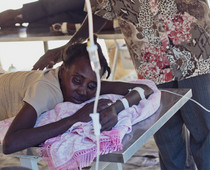
United Nations agencies and their partners on 12 November appealed for $164 million to support Haiti’s efforts to fight the deadly cholera outbreak that has already claimed over 900 lives in the Caribbean nation that has experienced a series of disasters, including the 12 January 2010 earthquake and the recent Hurricane Tomas.
The funds sought for the Cholera Inter-Sector Response Strategy for Haiti will go towards getting additional doctors, medicines and water purification equipment to respond to the epidemic, which has spread quickly since it was first confirmed on 22 October.
The bulk of the appeal – around $89 million – will be used for water, sanitation and hygiene, while $43 million will be used for health, and $19 million for efforts in the camps housing people displaced by the earthquake, according to the UN Office for the Coordination of Humanitarian Affairs (OCHA).
The appeal comes on the backdrop of reports that most countries have failed to deliver on Haiti aid pledges made in the wake of the catastrophic earthquake that killed more than 200,000 people and left over 1, 3 million homeless.
According to Edmond Mulet, head United Nations Stabilization Mission in Haiti (MINUSTAH), only $506 million, or 18.9 per cent of the international assistance promised for 2010 has so far been provided.
International donors promised $5.3 billion to Haiti after the earthquake. Only four countries have delivered any money at all. The US and Venezuela pledged more than $1 billion each but have delivered nothing. As at 14 July 2010,less than 2 percent of the money that has been promised had been delivered, according to a CNN investigation.
Former President Bill Clinton, a UN special envoy for Haiti, said then that he planned to put pressure on governments that had been slow to deliver on their promises.
‘I’m going to call all those governments and say, the ones who said they’ll give money to support the Haitian government, I want to try to get them to give the money, and I’m trying to get the others to give me a schedule for when they’ll release it,” Clinton told CNN’s Anderson Cooper.
When it comes to private charities, the same report however, says that some charities are spending money as fast as they get it, while others are planning long-term projects.
Doctors Without Borders – primarily a disaster-relief organization – is reported to have received $112 million and spent $65 million. The group reportedly plans to spend more than $109 million by the end of the year.
The Red Cross has spent $148 million of the $468 million it has taken in, and is said to be holding some money in reserve for more permanent projects such as shelter and water.
Private money has also come in from the Clinton Foundation, from Mexican telecommunications billionaire Carlos Slim Helu and Canadian mining investor Frank Giustra, but that is not part of the $5.3 billion pledged by countries.
Another more recent report of 29 September by Reuters, paints much the same picture.
UN News
